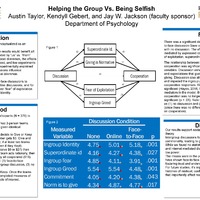Intergroup Cooperation
Item
Poster Number
28
Poster Title
Intergroup Cooperation
First Presenter
Austin Taylor
Other Contributors
Kendyll Gebert
Abstract
Introduction: Intergroup conflict can often be conceptualized as an intergroup social dilemma. That is, if the groups cooperate the results would benefit all. However, cooperation can be inhibited by “us” vs. “them” thinking. In real-world intergroup social dilemmas, the effects of face-to-face negotiations are mixed, and few experiments have examined such events. We experimentally examined how face-to-face and online discussions influence responses to intergroup group social dilemmas. Theoretically, we expected face-to-face discussions to promote more cooperation than online discussions, and for this effect to be mediated by reduced “fear” of exploitation and higher levels of superordinate identity.
Methods: Each laboratory session had nine participants (N = 376) in isolated cubicles. They were categorized into three ad hoc 3-person teams. Each team met separately and were given identical instructions. Each team was given $9 and had to decide to Give or Keep the full amount. Keep and each member gets $3. Give and that money is gone forever. However, if at least two teams Give, all three teams receive $18 (even if they Kept). Hence, it’s more rational to Keep (receive $9 or $27) than Give (receive $0 or $18). But if each team acts rationally, then all are poorer ($9) compared to if they all cooperated ($18). Random assignment to: (1) face-to-face intergroup discussion, (2) online intergroup discussion, (3) no intergroup discussion. Then, each team decided to Give or Keep. Back in isolation, participants completed measures of trust, identity, fear, and other constructs of interest.
Results: There was a significant discussion effect: 78% of teams in a face-to-face discussion Gave vs. 63% in an online discussion vs. 43% with no discussion. The effects of discussion on cooperation were mediated by expressed commitment to cooperate, reduced fear of exploitation, superordinate identity, and reduced ingroup greed.
Discussion: Our results support social identity theory and intergroup contact theory. Intergroup discussions fostered trust and feelings of commonality, leading to greater intergroup cooperation. While we found no statistical difference between face-to-face and internet mediated discussions, this may have been due to low power. The means were in the predicted direction and other studies have shown face-to-face contact is superior to online contact in fostering trust and understanding. For future studies, it’s important to integrate entrenched histories of mistrust, conflict, inequalities, and other variables that importantly affect real-world intergroup social dilemmas.
Methods: Each laboratory session had nine participants (N = 376) in isolated cubicles. They were categorized into three ad hoc 3-person teams. Each team met separately and were given identical instructions. Each team was given $9 and had to decide to Give or Keep the full amount. Keep and each member gets $3. Give and that money is gone forever. However, if at least two teams Give, all three teams receive $18 (even if they Kept). Hence, it’s more rational to Keep (receive $9 or $27) than Give (receive $0 or $18). But if each team acts rationally, then all are poorer ($9) compared to if they all cooperated ($18). Random assignment to: (1) face-to-face intergroup discussion, (2) online intergroup discussion, (3) no intergroup discussion. Then, each team decided to Give or Keep. Back in isolation, participants completed measures of trust, identity, fear, and other constructs of interest.
Results: There was a significant discussion effect: 78% of teams in a face-to-face discussion Gave vs. 63% in an online discussion vs. 43% with no discussion. The effects of discussion on cooperation were mediated by expressed commitment to cooperate, reduced fear of exploitation, superordinate identity, and reduced ingroup greed.
Discussion: Our results support social identity theory and intergroup contact theory. Intergroup discussions fostered trust and feelings of commonality, leading to greater intergroup cooperation. While we found no statistical difference between face-to-face and internet mediated discussions, this may have been due to low power. The means were in the predicted direction and other studies have shown face-to-face contact is superior to online contact in fostering trust and understanding. For future studies, it’s important to integrate entrenched histories of mistrust, conflict, inequalities, and other variables that importantly affect real-world intergroup social dilemmas.
Year
2022
Embargo
no embargo
